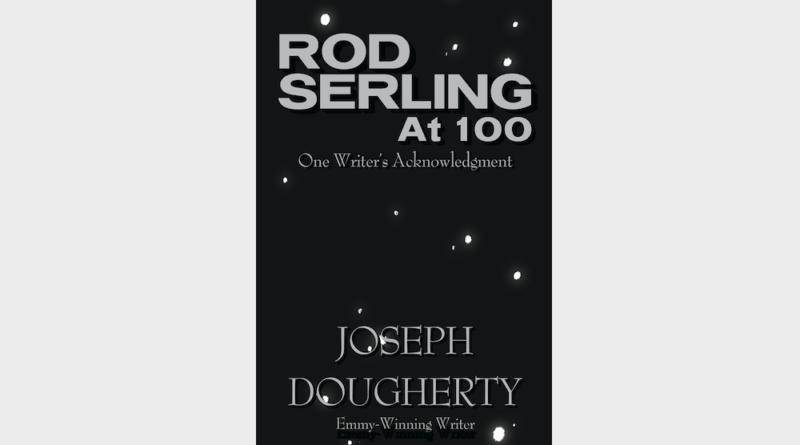REVIEW: This is the perfect book for lovers of ‘The Twilight Zone’ marathon
Image courtesy of FMP / Provided by Pacific and Court with permission.
Emmy-winning writer Joseph Dougherty has penned a love letter to the writing talents of Rod Serling on what would have been Serling’s 100th birthday. That’s right, the creator of The Twilight Zone would have reached the centenary milestone this past Christmas Day, and to honor that occasion, Dougherty thought it was fitting to look back at what sets Serling apart. The result of his efforts is Rod Serling at 100: One Writer’s Acknowledgment, out now from Fayetteville Mafia Press.
Dougherty’s focus is on the writing of The Twilight Zone and other Serling projects, and along the way of reading these 200 pages, fans of this iconic science fiction and fantasy show will be able to travel down memory lane and revisit some of their favorite episodes.
The book is structured in chronological order, starting with early TV projects that put Serling on the map, followed by a large section on The Twilight Zone and its continued influence. The final chapters focus on Serling’s post-TZ career, a time when the writer grew disillusioned with Hollywood and was somewhat discarded by the industry he had a hand in creating.
Not every Twilight Zone episode is covered. Instead, Dougherty writes about some of his favorites, plus common themes (or what he calls “variations”) that Serling kept coming back to, almost like a character’s leitmotif. One of the best chapters is on the concept of “Hometowns” and how Serling mined this idea in multiple episodes, including “Walking Distance,” a superb season-one story, and “A Stop at Willoughby,” usually an episode that makes it on the Top 10 of all time. What’s nice about Dougherty’s book is that he also delves into forgotten narratives, such as “Of Late I Think of Cliffordville,” one that didn’t immediately come to mind to this TZ fanatic.
The “Panic” chapter tells the story behind “The Monsters Are Due on Maple Street,” perhaps the one Twilight Zone episode that has been written about and studied more than any other. Clearly this classic half hour of television is a product of its time, which is meant as a compliment, because the frenzied reaction to an alien invasion on the bucolic Maple Street offers a metaphor for so many disturbances in mid-20th century America, including McCarthyism and the Red Scare. Dougherty couples an examination of “Maple Street” with “The Shelter” and “One More Pallbearer.”
The earliest Twilight Zone episodes are perhaps focused on a little more than the later ones, and TZ fans know exactly why. The first season of Serling’s creation is near-perfection, and the series lost some steam when it turned to one-hour episodes in the fourth season and back to 30-minute episodes in the fifth season. For example, the second-ever Twilight Zone episode is examined in the chapter “Losers.” That’s where Dougherty delves into “One for the Angels” and Serling’s creation of Lew Bookman, a pitchman played by the wonderful character actor Ed Wynn. Other “losers” pop up in “In Praise of Pip” and “The Changing of the Guard.”
Most interesting about Dougherty’s analysis is how he picks apart Serling’s writing choices, including the creator’s propensity for recycling names and themes. He casts Serling almost like a composer who continually strives for perfection by attempting to improve upon earlier projects.
Dougherty is not interested in hero worship. Although he holds Serling in high regard, he also discusses the less-effective characters and episodes that populate some of the writer’s oeuvre. Some of this criticism is included in the examination of the post-TZ projects Serling worked on, including Carol for Another Christmas, The Loner and Night Gallery. Of these three projects, perhaps Night Gallery is the most well known, but I found myself drawn to finding a copy of Carol for Another Christmas and how Serling subversively turned the mirror on American society and the world, which he continually did throughout his decades-long career.
Rod Serling at 100 is not a biography, nor is it a companion text for those looking to binge the entire series. Instead, the book is one writer’s appreciation of another writer’s work. Within this appreciation, there are personal stories of how specific Twilight Zone episodes impacted Dougherty’s personal and professional career, and how Dougherty left some Easter eggs in his own work that call out this Serling influence. One only needs to look at some of the episode titles of thirtysomething to realize Dougherty has been a Serling aficionado for some time. Also, there’s an interesting anecdote about when Dougherty met Serling in person and what transpired while they both sat on the same couch.
There’s a lot of literature out there about Serling and The Twilight Zone. Dougherty’s book offers a novel approach to this historical figure and his TV legacy by focusing on the craft of writing and trying to understand the choices Serling made on the page. For lovers of The Twilight Zone, Rod Serling at 100 is a must read because it offers a unique lens on this beloved cultural artifact.
By John Soltes / Publisher / John@HollywoodSoapbox.com
Rod Serling at 100: One Writer’s Acknowledgment by Joseph Dougherty. 250 pages. Fayetteville Mafia Press. $19.99. Click here for more information.

